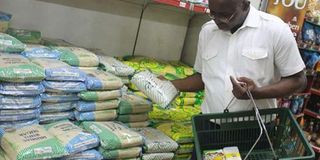East Africa hit by new round of trade disputes

A man pick sugar at a supermarket in Nairobi. FILE PHOTO | NMG
What you need to know:
Traders have stepped up imports from Uganda and the cross-border trade is expected to rise as maize prices in the neighbouring country dropped to Ksh16 (about Tsh320) a kilogramme compared to Kenya’s average cost of Ksh51.47 (about Sh1,030).
Dar/Kampala/Nairobi. The East Africa Community (EAC) is witnessing another round of trade wars among member states, with Uganda complaining about its sugar being denied entry into Tanzania. This is happening at a time when in Kenya, the government has raised the alarm over an influx of cheap maize from Uganda that look set to depress grain prices ahead of harvest.
Traders have stepped up imports from Uganda and the cross-border trade is expected to rise as maize prices in the neighbouring country dropped to Ksh16 (about Tsh320) a kilogramme compared to Kenya’s average cost of Ksh51.47 (about Sh1,030).
“Obviously, this will affect farmers’ prices because we are also expecting a bumper harvest this year. But we do not have much control over it because the East African Protocol allows for free movement of goods,” said Agriculture chief administrative secretary Andrew Tuimur.
Dr Tuimur said farmers will have to make their maize competitive by reducing cost of production and remaining competitive in the region.
In Uganda, the Daily Monitor reported yesterday that Tanzania had slapped a 25 per cent import duty on sugar from Ugandan, contrary to the zero rate recommendation by the EAC Community Common Market Protocol.
The Uganda Revenue Authority (URA) assistant commissioner for public and corporate affairs, Mr Vincent Seruma, said at the weekend that sugar (which was alleged to have been sneaked into Uganda from Kenya) that had been exported by Kakira Sugar Works in May had been denied entry to Tanzania and forced to return. Kakira Sugar Works, according to URA, had exported 12,000 bags (600 tonnes) of locally manufactured sugar but was denied entry.
“Under the EAC Common Market Protocol, this [sugar] is supposed to enjoy preferential treatment at 0 per cent Import Duty within in EAC partner states because it is wholly produced in Uganda. However … Tanzania decided to impose duty of 25 per cent, a violation of the EAC rules of origin and the Common Market Protocol,” he said.
The director of taxpayer services and education at Tanzania Revenue Authority (TRA), Mr Richard Kayombo, requested for time to read the sugar story before making a comment. “I can only comment after I get convinced that there is such a report from Uganda,” he told The Citizen by phone yesterday. During the 2018/19 budget, Tanzania changed the EAC Common External Tariff with a view to charge an import duty of 25 per cent for finished goods, 10 per cent for intermediate goods and zero per cent for raw materials and capital goods.
According to the changes exporters dealing in sugar, sweets, edible oil, safety matches, steel and iron products, chocolates, tomato sauce, meat, sausages, biscuits and mineral water face tariffs ranging between 10 per cent and 35 per cent to access the Tanzania market.
Mr Jim Kabeho, the Uganda Sugar Manufacturers Association chairman and out-going East African Business Council chairman, at the weekend told Daily Monitor that the charge on sugar was a “disregard” of agreed EAC Common Market Protocol.
“The sugar was allocated to Tanzania Sugar Industries. We negotiated for the permit through Kagera Sugar Manufacturers [before it was] shipped. But then Tanzania Revenue Authority insisted on charging us. We [had no alternative but to] bring it back,” he said.
The Minister for Industry, Trade and Investment, Mr Charles Mwijage said the issue fell under TRA’s docket.
The East African Common Market provides for the best way to deal with trade spats between/among member states. However, any product, imported into one of the partner states without following the agreed common external tariffs, will always find it difficult to penetrate other markets within the bloc, a source told The Citizen yesterday.




